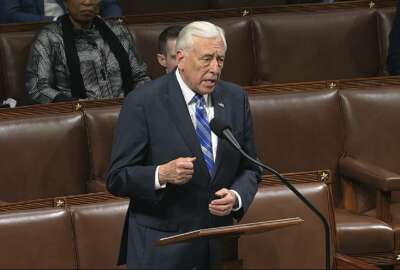
Trump removal of IGs has many asking for more protection for them
President Trump's recent removals and reassignments of agency inspectors general has raised the ire of good government groups and some members of Congress.
Best listening experience is on Chrome, Firefox or Safari. Subscribe to Federal Drive’s daily audio interviews on Apple Podcasts or PodcastOne.
President Trump’s recent removals and reassignments of agency inspectors general has raised the ire of good government groups and some members of Congress. They’ve revisited the IG enabling legislation and concluded IGs need more independence. The Project on Government Oversight is one of those groups. POGO’s director of public policy, Liz Hempowicz, joined Federal Drive with Tom Temin to discuss.
Interview transcript:
Tom Temin: Liz, good to have you back.
Liz Hempowicz: Thanks for having me.
Tom Temin: So what is your take? I mean, well, let’s talk about the legislation that has passed the House, I guess, by House Democrats have proposed a bill that would sharply limit the conditions under which a president can remove an IG. Tell us what’s behind that and what some of the theory is behind those provisions.
Liz Hempowicz: So I think some of the theory behind the decision is that inspectors general operate in this interesting space where they are firmly situated within the executive branch, but they also report directly to the Congress and they’re required to do their jobs even though they’re political appointees, for the most part, they’re required to do their jobs in a non partisan way. So structurally, they need a little bit more independence than other political appointees whose main job is really kind of to make the administration look good. Inspectors general if they’re doing their jobs well, may have sometimes make the administration look bad when deserved. You mentioned the House language. So the language that passed the House recently is actually not the first time that the House has tried to give inspectors general for cause removal protections. Very similar language passed with overwhelmingly bipartisan support in 2008. And I say, overwhelmingly bipartisan support. I don’t mean there were like a handful of Republicans that voted for that legislation. The Republicans such as Kevin McCarthy and Jim Jordan, they were all behind these ideas in 2008. But what the legislation would do would limit the reasons why a president could remove an inspector general. So right now, the law doesn’t place any limits, even though the Congress, if you go through the legislative history, they believe when they passed the requirement of notice to Congress before you fire an inspector general in the 30 days notice and requiring a communication to the Congress would have served as a type of protection. You know, the legislative history goes into some examples and says we believe this requirement will lessen the chance that the executive will fire an inspector general for improper reason. So even at the beginning of the inspector general system, the Congress acknowledged that the President maybe shouldn’t have unfettered ability to fire these these independent watchdogs, because their job is to be an independent watchdog.
Tom Temin: Sure, and I think some administrations earlier on felt that the look of firing an IG was not worth the political cost of just leaving them in there. But what about the flip side? I mean I’ve had officials over the years tell me that an IG who was appointed by another party while they’re in seems to take a special relish in turning the screws, and maybe so maybe not, it’s hard to tell, but how do you keep an inspector general in line who might be out of control and looking for things that may not be there or I don’t know, exaggerating?
Liz Hempowicz: No, I think that’s a fair question. But I guess I take issue with the idea that an inspector general, you know, that the relish behind uncovering waste, fraud and abuse would somehow taint those findings. So if there are actual concerns that the inspector ieneral is not doing their job well, of course they should be removed. But doing their job well does not mean doing their job in a way that reflects well on the administration. That’s not the role of an inspector general. And inspectors general across administrations have raised very serious concerns about the operations of those agencies, and have returned billions of dollars in taxpayer dollars that had been misspent. You know, the idea that an inspector general that was appointed by a democratic administration will somehow find things that don’t exist in a republican administration — I think that’s not what we’re talking about here. What we’re talking about is inspectors general doing their jobs well, and finding actual waste, fraud and abuse and losing their jobs over it. That’s a very different story. Whether the President has the authority now or not to just remove inspectors general across the board, I think the conversation we’re having today and not just between you and me, but kind of the Congress is having, that the public is having, we need to consider strongly that inspectors general are very different than other political appointees and their jobs require them to be independent.
Tom Temin: That’s really the difference is that kind of I don’t know whether it’s a dotted line or a solid line or a wavy line to Congress that the IGs have that other appointees simply don’t have at all. And what about getting Back to the House bill and those provisions to give them seven year terms and to sharply limit the removal cause to malfeasance or theft or that kind of thing. Could that pass constitutional muster do you think? It would certainly be challenged on that ground.
Liz Hempowicz: That’s a fair question. And there is a case in front of the Supreme Court right now that we’re waiting a decision on that may kind of go into these constitutional questions about for cause removal protections. But I just want to mention that four cause removal protections already exist in law for multiple positions. And so this is not a space where Congress has hesitated before. I would argue that inspectors general or than the top position that deserve these type of protections just for the nature of their job. But then there’s other individuals like the head of the Office of Special Counsel that currently has for cause removal protections. That’s another office where it makes total sense because when you’re in these independent watchdog positions, to do your job well will eventually require you to make public statements or make them determinations or make recommendations or findings that run counter to the political interests of the party that has control of the executive branch, because inspectors general work for taxpayers directly. And you made the analogy earlier, whether it was a straight line, a dotted line or a wavy line. It is a direct line to Congress, inspectors general, the agency employees and political leadership at agencies have no authority to stop an inspector general from talking to Congress. Because, they do have a duty to report directly to the Congress and to the executive branch. They are a very unique position in government and I think should be treated as such. But you’re right, the legislation would list out appropriate reasons why a president would be able to remove an inspector general and I think that model of for cause removal protections is something that we’ve seen in law in other places, and also sometimes coupled with terms. One thing I think that is important to mention is that for cause removal protections are not a prohibition against removing an inspector general that is not doing their job. And in fact, I think, you know, there’s one way that we can look at for cause removal protections as actually a roadmap to remove bad inspectors general or inspectors general that shouldn’t be there without raising those types of questions that we’re asking now about is this a proper firing or not? Is there something going on behind the scenes? And so there are other initiatives I think that are being discussed right now in Congress that would require a kind of enhanced notification. And it’s something below for cause removal, but would require the president to give more information than he’s required to right now, because what we’ve seen is that the current legal requirements on the president are incredibly low. You know, he’s in line with the statute. There’s case law that says the all the President has to say is I’ve lost confidence in this inspector general, that doesn’t really give Congress anything to work with. And so the whole point of this 30 day notice requirement and during that time, the President is not allowed to fire the inspector general. And the point for that 30 day window is so that Congress if there is something improper about that removal has the space to engage with the executive and push back on that decision and maybe say these are the steps that we’re going to take. We’re not going to mandate that you rehire this inspector general, but maybe we’re not going to give you every judicial nomination you’ve put in front of the Senate right now while you’re also systematically removing all these independent watchdogs.
Tom Temin: So there are some tools of leverage here, I guess. And the final question, has Senator Chuck Grassley weighed in he’s a prominent republican has always been a backer of whistleblowers and people like that. But he’s been I would think his imprimatur on this would really help things along from that standpoint.
Liz Hempowicz: Yeah. Senator Grassley has written a few letters to the White House and has been vocal about his displeasure with the response from those letters. But I think you’re right there’s a lot of people looking to Senator Grassley to kind of lead the charge right now in the way that he had in previous administers When there were things like this, and I don’t want to say that we’ve seen this scenario before, because I don’t think we have. But I also, you know, I have a little bit of sympathy for Senator Grassley, because it is, of course, a Republican Senator, while there is a Republican President is going to give that President every benefit of the doubt. And I think that that’s what we’ve seen from Senator Grassley, you know, he has been trying to engage with the White House as if these are normal times and as if these are normal decisions with normal explanations. And I think the latest statement I saw from Senator Grassley last week after the White House sent such an incredibly insulting letter back to the Congress, when Senator Grassley was asking for why these inspectors general had been fired. He’s not satisfied with that response, but we haven’t seen much else. I think Senator Grassley has talked about working on legislation, and I think that would be helpful. But there are other things that a senator can do, you know, the Senate takes votes and decisions every day that are of consequence to the White House and so there are ways to put pressure on the White House against the improper removal of an inspector general, because when they passed the Inspector General Act the Congress was considering whether or not these for cause removal protections were constitutional. And they thought maybe they aren’t. And so instead, let’s try to give us space to engage with the executive if an inspector general is removed, but I don’t think the lawmakers that pass the IG Act or even that passed the updates to the IG Act since, I don’t think they’ve really envisioned this scenario where the White House is just summarily ignoring congressional requests, and not even engaging with members of their own party that are just trying to do their jobs.
Tom Temin: Liz Hempowicz is Director of Public Policy at the Project on Government Oversight. Hey, thanks so much.
Liz Hempowicz: Thanks for having me.
Copyright © 2024 Federal News Network. All rights reserved. This website is not intended for users located within the European Economic Area.
Tom Temin is host of the Federal Drive and has been providing insight on federal technology and management issues for more than 30 years.
Follow @tteminWFED





